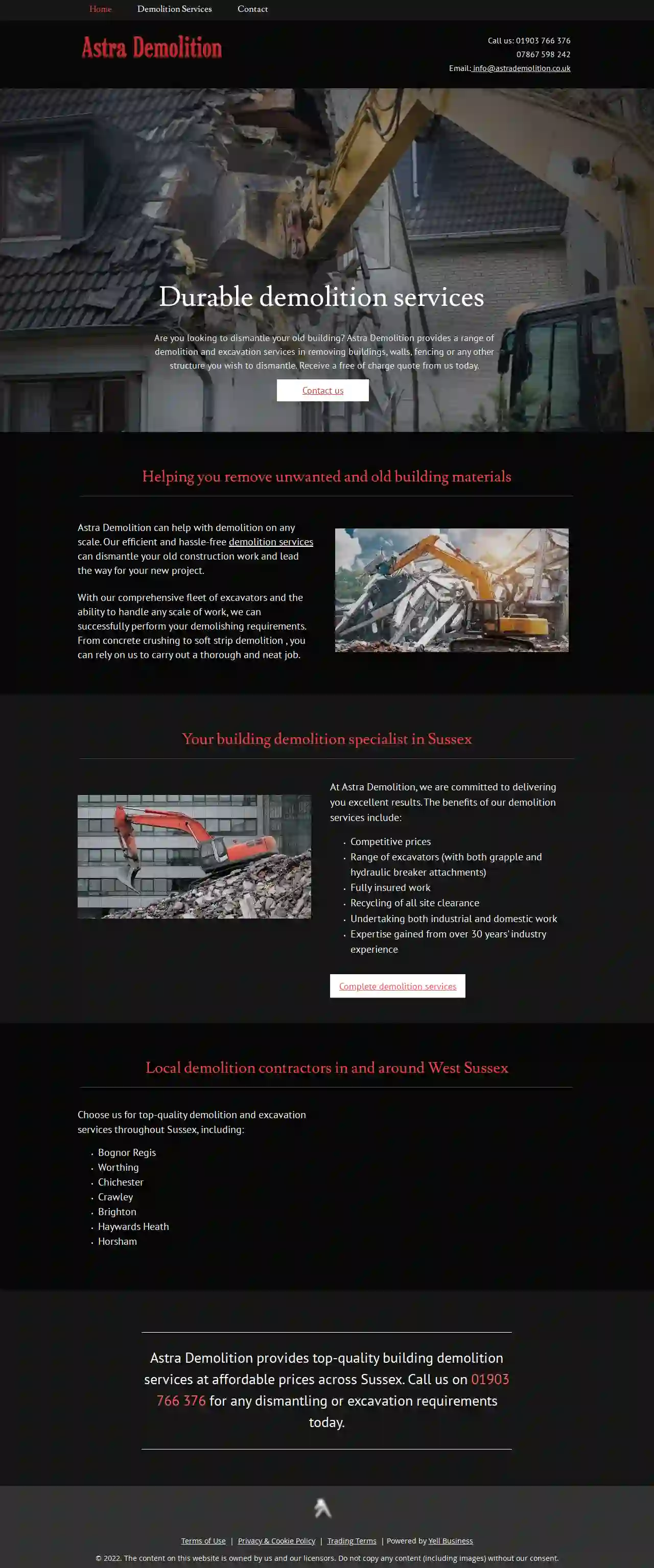Excavation Contractors Selsey
Find top Land Excavation in Selsey
Get multiple Excavation Contractor quotes for your project today! Compare profiles, reviews, accreditations, portfolio, etc... and choose the best offer.

T King & Son Groundwork Ltd
Gentles Lane, Passfield, Liphook, GU30 7RY, GBT. King & Son (Groundworks) Ltd: Your Trusted Groundworks Partner in Hampshire For over 50 years, T. King & Son (Groundworks) Ltd has been a leading provider of groundworks services in Liphook, Hampshire. We've built a strong reputation for delivering exceptional quality and efficiency, earning the trust of countless satisfied customers. Our commitment to excellence is evident in every project we undertake, from residential to commercial groundworks and maintenance. We understand that construction work can be disruptive, which is why we prioritize minimizing disruption and delivering projects on time and within budget. Our team of skilled professionals is dedicated to providing a seamless and hassle-free experience for our clients. Whether you're building your dream home, expanding your business, or need reliable commercial maintenance, T. King & Son (Groundworks) Ltd is your trusted partner. We're committed to exceeding your expectations and delivering results that stand the test of time.
- Services
- Why Us?
- Gallery
Get Quote
Central Plant Hire
4.937 reviewsHolmbush Farm, Crawley Road, Holmbush Farm Crawley Road Faygate Horsham West Sussex, Horsham, RH12 4SE, GBCentral Plant Hire is a leading provider of plant and digger hire in West Sussex and Surrey. We offer a wide range of equipment to suit all your needs, from mini diggers to dumpers and attachments. We are committed to providing our customers with the highest quality equipment and service. Our team is experienced and knowledgeable, and we are always happy to answer your questions. We offer competitive rates and flexible hire options to suit your budget. We are proud to be a local business, and we are committed to supporting our community. We are a member of the Construction Industry Federation (CIF) and we are fully insured.
- Services
- Why Us?
- Accreditations
- Gallery
Get Quote
Robinsons Haulage Sussex Ltd
4.913 reviewsArea 3, Bairds Business Park, Hobbs New Barn, Bairds Business Park Hobbs New Barn Gravetts Lane, Climping West Sussex, Climping, BN17 5RX, GBAbout Robinsons Haulage (Sussex) Ltd Robinsons Haulage (Sussex) Ltd is a well-established haulage and transport company, founded in 2007. We've built a strong reputation for providing reliable and efficient services throughout the UK and Europe. Whether you need to move a single pallet or a full load, you can trust us to deliver on time and with the utmost care. We've grown from a single 3.5 tonne van to a fleet of vehicles ranging from 3.5 tonne dropside vans to 7.5 tonne and 18 tonne flatbeds and curtainsided vehicles with tail-lift loading. This allows us to cater to a wide range of transport needs, ensuring we have the right vehicle for every job. Customer satisfaction is at the heart of everything we do. Our team, with years of combined experience in the transport industry, is dedicated to providing exceptional service. We take pride in our commitment to safety and security, ensuring your goods are in safe hands at all times. We're proud to be FORS (Bronze) Accredited, demonstrating our commitment to safety, efficiency, and environmental responsibility. Our experienced and well-trained staff are committed to providing our clients with the highest level of service, keeping them informed every step of the way.
- Services
- Why Us?
- Accreditations
- Gallery
Get Quote
Astra Demolition
51 reviewsWorthing, GBDurable demolition services Are you looking to dismantle your old building? Astra Demolition provides a range of demolition and excavation services in removing buildings, walls, fencing or any other structure you wish to dismantle. Receive a free of charge quote from us today. Helping you remove unwanted and old building materials Astra Demolition can help with demolition on any scale. Our efficient and hassle-free demolition services can dismantle your old construction work and lead the way for your new project. With our comprehensive fleet of excavators and the ability to handle any scale of work, we can successfully perform your demolishing requirements. From concrete crushing to soft strip demolition, you can rely on us to carry out a thorough and neat job. Your building demolition specialist in Sussex At Astra Demolition, we are committed to delivering you excellent results. The benefits of our demolition services include: Competitive prices Range of excavators (with both grapple and hydraulic breaker attachments) Fully insured work Recycling of all site clearance Undertaking both industrial and domestic work Expertise gained from over 30 years' industry experience Complete demolition services Local demolition contractors in and around West Sussex Choose us for top-quality demolition and excavation services throughout Sussex, including: Bognor Regis Worthing Chichester Crawley Brighton Haywards Heath Horsham Astra Demolition provides top-quality building demolition services at affordable prices across Sussex. Call us on 01903 766 376 for any dismantling or excavation requirements today.
- Services
- Why Us?
- Gallery
Get Quote
Dancy Building Contractors Limited
55 reviewsUnit 1, The Old Dairy, Steyning, BN44 3DZ, GBDancy Building Contractors: Modern Building, Traditional Values Dancy Building Contractors is a reputable and experienced building company based in Steyning, West Sussex. We are committed to delivering high-quality building services with a focus on traditional values and modern construction techniques. Our team of skilled professionals is dedicated to providing exceptional craftsmanship and customer service, ensuring your project is completed to the highest standards. We understand that building projects can be complex and require careful planning and execution. That's why we take a collaborative approach, working closely with our clients to understand their needs and vision. We provide clear communication, transparent pricing, and a commitment to delivering projects on time and within budget. Whether you're planning a home extension, loft conversion, or a complete new build, Dancy Building Contractors has the expertise and experience to handle your project with confidence. We are proud of our reputation for quality, reliability, and customer satisfaction. Contact us today to discuss your building project and let us help you bring your vision to life.
- Services
- Why Us?
- Gallery
Get Quote
Arundels Construction
54 reviews13 The Cape, Littlehampton, West Sussex, BN17 6PL, GBArundels Construction Ltd Based in West Sussex, Arundels Construction Ltd has built a lasting reputation as a company of general and new home builders. With high-end services and an attractive pricing policy that can’t be beaten by any of our competitors, we transform properties in Bognor Regis, Chichester, Worthing and locations across the surrounding areas. About Arundel Builders With a sizeable portfolio of repeat customers who trust our general and new home builders completely, Arundels Construction Ltd will deliver a stress-free project to exceed your expectations. The procurement of quality materials from a trusted supplier network, coupled with our ability to take on installation and electrical work, has seen our company build a first-class reputation for its standards of workmanship and approach to superior customer service. We carry the required liability insurances, offer guarantees of between 15 and 25 years on our completed work, and have a perfect “10” rating on the Checkatrade website where our own customers review our projects. What Sets Us Apart Where we differ from other builders is in our ability to manage a project from the design stage all the way through to completion. Arundels Construction Ltd can include architectural work, engineering calculations and private building inspections in your package, which we adapt to your personal requirements.
- Services
- Why Us?
- Testimonials
- Gallery
Get Quote
Timberley Projects Ltd Groundworks
51 reviewsUnit 8, Hardham, Mill Business Park, Pulborough, West Sussex, RH20 1LA, GBGroundworks… It’s what we do With over twenty-five years industry experience our family-run team works with both commercial and residential clients. We specialise in groundworks, driveways and equestrian facilities. Attention to Detail No matter how large, or small each job is, we know it’s the details that matter. That’s why we’re the groundworks team of choice for award-winning companies, such as ‘The Pig’. It’s also why our residential customers love doing business with us. We leave no stone unturned!
- Services
- Why Us?
- Our Team
- Gallery
Get Quote
Coastline Drains
4.67 reviewsUnit 3, Littlehampton Marina, Ferry Road, Littlehampton, West Sussex, BN17 5DS, GBWelcome to Coastline Drains We strive to be the best and the most competent, efficient, and competitive drainage company in the area. Your Drainage Experts We strive to be the best and the most competent, efficient, and competitive drainage company in the area. The services that we offer are always executed using fully experienced engineers that will always go "the extra mile" to give complete customer satisfaction. We also believe that we are the most competitive in the area and we pledge to beat ANY written quotation for repair/replacement works. About Coastline Drains Coastline Drains was formed in 2000 as a family business and since this time we have constantly delivered the most competitive and comprehensive service in the area. Our reputation is the envy of our competitors who often try to replicate our professionalism, dedication, honesty and integrity (and even our name!). The services that we offer are always executed using fully experienced engineers that will always go "the extra mile" to give complete customer satisfaction. We also believe that we are the most competitive in the area and we pledge to beat ANY written quotation for repair/replacement works. Our Mission Statement To be totally transparent about our low fixed pricing structure To keep the customer fully informed throughout any and all works To maintain our efficiency, integrity, honesty, reliability and professionalism To strive to eclipse our competitors in everything we do and the way we operate Quite simply, we strive to be the best and the most competent, efficient, and competitive drainage company in the area Our Current client list Local Authorities Housing Associations Residential Letting Agents Commercial Letting Agents Facility Management Companies Property Management Companies Schools and Colleges Leisure Centres Businesses Private domestic dwellings
- Services
- Why Us?
- Testimonials
- Gallery
Get Quote
JPG groundworks
Worthing, GBAbout JPG JPG Groundworks was established in the year 2000, initially focusing on domestic groundworks and building projects. Over the past decade, we have transitioned our expertise predominantly towards agricultural and estate groundwork projects. This includes the construction of new buildings, building conversions, and comprehensive refurbishments. We take pride in our modern fleet of well-maintained excavators, dumpers, rollers, and other essential equipment. Our commitment lies in delivering a competitive and professional package tailored to meet the specific needs of each client. Our service area encompasses West Sussex, Hampshire, Surrey, and parts of East Sussex.
- Services
- Why Us?
- Gallery
Get Quote
Horsham Landscaping Specialists
551 reviewsHorsham, GBAbout Us Horsham Landscaping Specialists was founded by our owner, James. With over a decade of experience in the industry, James possesses a deep passion and keen eye for detail when it comes to garden design and construction. Our entire company is built upon a team with a strong work ethic and a shared passion for landscaping, always striving to deliver the highest quality results. This dedication has fueled our rapid growth, allowing us to assemble a team of dedicated landscapers serving both residential and commercial clients across the UK. Based in the Surrey Hills, Horsham, we proudly serve customers in the local and surrounding areas, including Crawley, Haywards Heath, Kilwood Vale, Billingshurst, Gatwick, London, Brighton, and Worthing. We undertake all aspects of hard landscaping, including retaining walls, patios, driveways (block, loose stone, resin), decking, and specialize in artificial grass.
- Services
- Why Us?
- Our Team
- Testimonials
- Gallery
Get Quote
Over 13,059+ Excavation Contractors in our network
Our excavation contractors operate in Selsey & surroundings!
ExcavationHQ has curated and vetted the Best Excavation Contractors in Selsey. Find the most trustworthy business today.
Frequently Asked Questions About Excavation Contractors
- Mechanical Excavation: Utilizing heavy equipment like excavators, backhoes, bulldozers, and loaders, suitable for most projects.
- Hand Excavation: Using hand tools (shovels, picks) for smaller excavations or delicate work near utilities.
- Blasting: Employing explosives to break up rock or hard materials, typically for large-scale projects.
- Hydro Excavation: Using high-pressure water jets to loosen and remove soil, often used for locating utilities or delicate excavation.
- Vacuum Excavation: Employing a vacuum system to suck up excavated material, suitable for safe excavation near utilities or in confined spaces.
- Planning and Surveying: Defining the excavation area, marking utility lines, and determining the required depth and grade.
- Site Preparation: Clearing vegetation, removing obstacles, and ensuring site accessibility.
- Excavation: Using appropriate equipment (excavators, backhoes, etc.) to remove earth and create the desired excavation.
- Hauling and Disposal: Transporting excavated material to designated disposal sites, complying with environmental regulations.
- Backfilling and Compaction: Refilling the excavation with suitable material and compacting it to achieve the required density and stability.
- Grading and Finishing: Leveling and shaping the surface to the final grade for landscaping or construction.
- Hauling to Designated Disposal Sites: Transporting excavated material to approved landfills or recycling centers.
- Recycling or Reuse: If suitable, some excavated soil might be recycled for other projects or reused on-site for landscaping or backfilling.
- Complying with Regulations: Adhering to local and environmental regulations for soil disposal to prevent contamination or illegal dumping.
What is the difference between excavation and grading?
Excavation: Primarily involves removing earth or other materials from a site. It's about digging down and creating space.
Grading: Focuses on shaping and leveling the ground to a specific slope or elevation. It's about adjusting the existing terrain.
For example, you might excavate a foundation and then grade the surrounding area to ensure proper drainage and a level surface for landscaping.
What are the different methods of excavation?
What is the excavation process?
How do you handle soil disposal after excavation?
What is the difference between excavation and grading?
Excavation: Primarily involves removing earth or other materials from a site. It's about digging down and creating space.
Grading: Focuses on shaping and leveling the ground to a specific slope or elevation. It's about adjusting the existing terrain.
For example, you might excavate a foundation and then grade the surrounding area to ensure proper drainage and a level surface for landscaping.
What are the different methods of excavation?
- Mechanical Excavation: Utilizing heavy equipment like excavators, backhoes, bulldozers, and loaders, suitable for most projects.
- Hand Excavation: Using hand tools (shovels, picks) for smaller excavations or delicate work near utilities.
- Blasting: Employing explosives to break up rock or hard materials, typically for large-scale projects.
- Hydro Excavation: Using high-pressure water jets to loosen and remove soil, often used for locating utilities or delicate excavation.
- Vacuum Excavation: Employing a vacuum system to suck up excavated material, suitable for safe excavation near utilities or in confined spaces.
What is the excavation process?
- Planning and Surveying: Defining the excavation area, marking utility lines, and determining the required depth and grade.
- Site Preparation: Clearing vegetation, removing obstacles, and ensuring site accessibility.
- Excavation: Using appropriate equipment (excavators, backhoes, etc.) to remove earth and create the desired excavation.
- Hauling and Disposal: Transporting excavated material to designated disposal sites, complying with environmental regulations.
- Backfilling and Compaction: Refilling the excavation with suitable material and compacting it to achieve the required density and stability.
- Grading and Finishing: Leveling and shaping the surface to the final grade for landscaping or construction.
How do you handle soil disposal after excavation?
- Hauling to Designated Disposal Sites: Transporting excavated material to approved landfills or recycling centers.
- Recycling or Reuse: If suitable, some excavated soil might be recycled for other projects or reused on-site for landscaping or backfilling.
- Complying with Regulations: Adhering to local and environmental regulations for soil disposal to prevent contamination or illegal dumping.